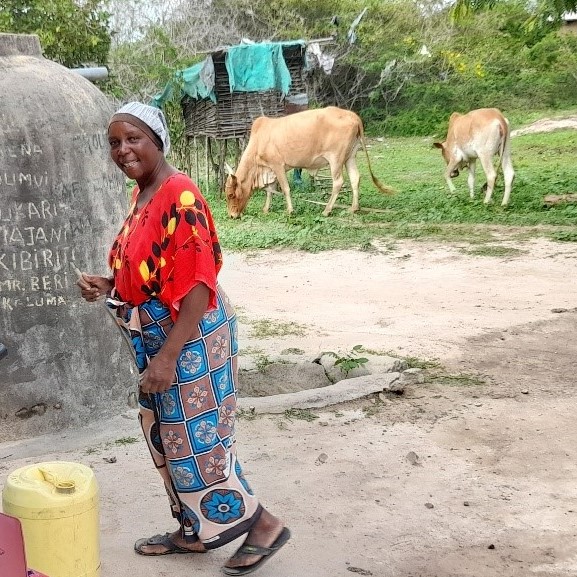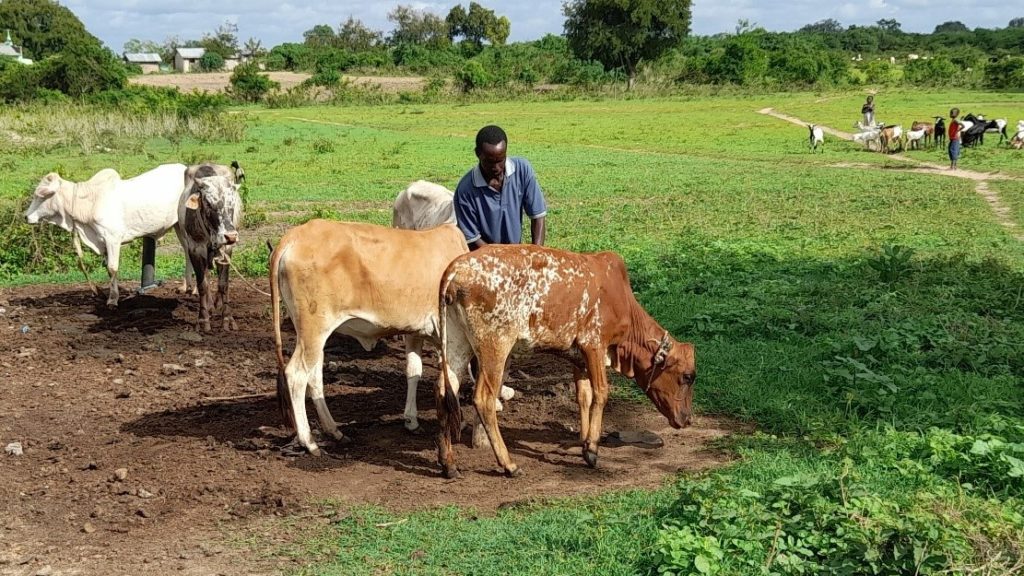
A Lasting Impact Part 4: Kenya Bamba
The very first program funded by Growing Hope Globally was located in Bamba, Kenya. It began in 2001, implemented by World Renew and local partner Anglican Development Services – Pwani. Twenty years later, residents of Bamba are still seeing the lasting impact. The following are just a few examples:
Christine
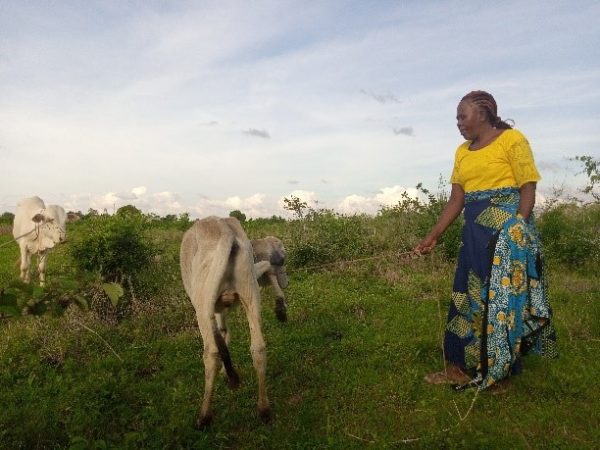
Back in 2003, Christine was in desperate need of income, but she had no desire to get involved with ADS Pwani or any other organization that was assisting her community. Her best friend had convinced her to go to a nearby town to earn money through prostitution. The day before they were planning to leave, her curiosity got the best of her and she joined a group of people that was gathering to learn about a training opportunity for Community Animal Health Assistants (CAHAs). Before she knew it, she had been nominated by the group to attend training at a Farmers Training Center in Mtwapa, several hours away. The next day, she left, not to start a life of prostitution, but to become a CAHA.
“I don’t know what I would be by now if It weren’t for the CAHAs training I attended at Mtwapa Farmers Training Center.”
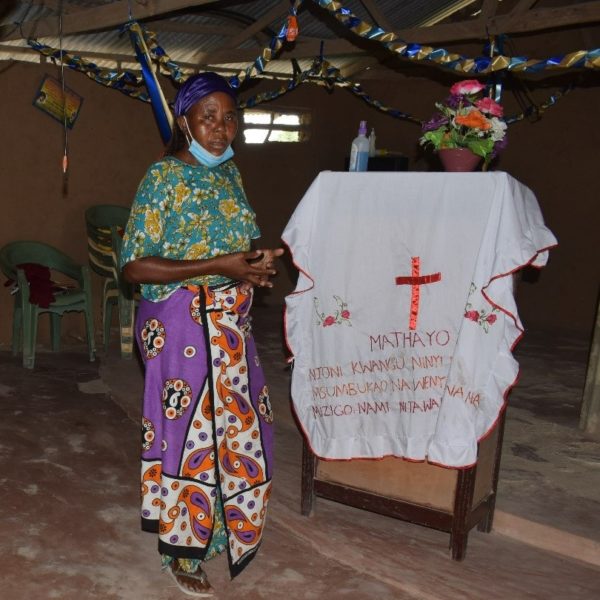
On her way back from the training, she used the little cash she had to buy two chickens. She began serving her community, helping them with their animals. At the same time, God began to work in her heart, prompting her to lead his flock in another way. She soon began serving as an assistant pastor at River of Life Ministries. Then, in 2012, she was ordained. She now pastors a church of 150 members.
In the last few years, she has begun raising cows to supplement her income and has been able to use the funds to purchase a prime plot of land in the Bamba town center and begin building a house where she and her elderly mother will live. She still uses the skills she learned as a CAHA to treat her own cows and she also attends to her neighbor’s animals when she is not busy with pastoral work.
Khadija
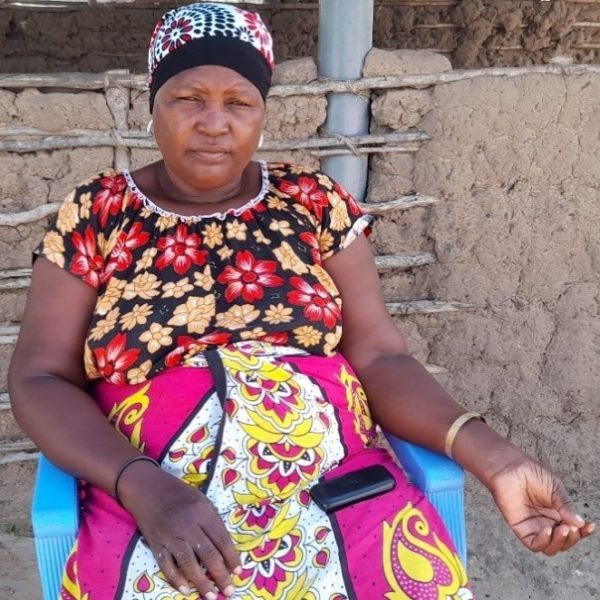 During the program, Khadija was a member of a Chapungu Farmer Field School and began practicing kitchen gardening. These days, vegetable growing has become her primary source of income. She is part of a self-help group made up of 26 women, 5 of whom were also members of Chapungu Farmer Field School. Together, they farm a plot of land near a seasonal water pan, earning about $375 per month.
During the program, Khadija was a member of a Chapungu Farmer Field School and began practicing kitchen gardening. These days, vegetable growing has become her primary source of income. She is part of a self-help group made up of 26 women, 5 of whom were also members of Chapungu Farmer Field School. Together, they farm a plot of land near a seasonal water pan, earning about $375 per month.
“Kitchen gardening is still outstanding for me as it has kept me and my family afloat to date. My livelihood rotates around vegetable cultivation.”
Unlike Christine, Khadija did not have the opportunity to attend animal health training in Mtwapa, but she learned a lot from those who did have the opportunity to attend. She now has 7 cows, 10 goats and 9 chickens, which she keeps healthy using that knowledge. She also earns money by offering basic animal treatment for other animals in the community.
Khadija is a widow with two sons and six grandchildren. Her income from growing vegetables and raising animals has enabled her to pay the necessary school fees so her children have the opportunity to continue all the way through secondary school.
Shida
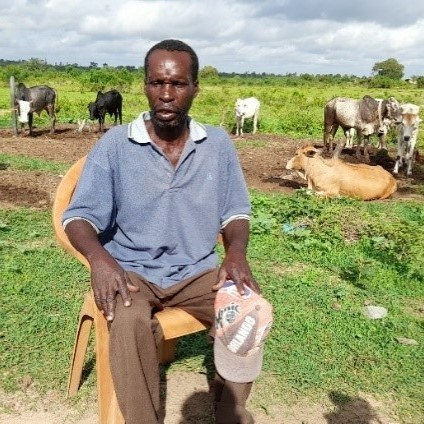 Shida is a soft-spoken, unassuming man. He was only able to stay in school through grade 4, lacking the resources to continue further. Prior to the program, he was a subsistence farmer, struggling unsuccessfully to grow enough food to meet the needs of his wife and eight children. He wanted to be able to provide for his family, so when the program began, he joined a Farmer Field School, attended training to become a CAHA, and learned about agribusiness.
Shida is a soft-spoken, unassuming man. He was only able to stay in school through grade 4, lacking the resources to continue further. Prior to the program, he was a subsistence farmer, struggling unsuccessfully to grow enough food to meet the needs of his wife and eight children. He wanted to be able to provide for his family, so when the program began, he joined a Farmer Field School, attended training to become a CAHA, and learned about agribusiness.
These days, Shida has a diversified farm and no longer struggles to make ends meet. He has a 3-acre plot of land where he grows food for his family. Unfortunately, in years like this one, the crops sometimes fail due to lack of rain. However, he still has his other income to fall back on.
He has five beehives and harvests 100-110 liters of honey each year, adding more than $500 to his annual income.
Shida’s skills as a CAHA are in demand. In a typical month, he treats approximately 300 animals, earning over $400. He collaborates with a veterinarian and always calls the doctor when he encounters a difficult case, giving community members confidence that their animals are well-cared-for.
“I am able to meet my family’s needs out of the earnings I get from the CAHA Services I offer to the neighborhood”.
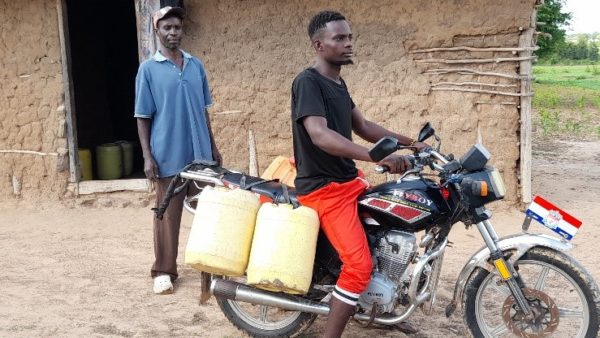 Now his family of ten is thriving. They have purchased a secondhand motorbike, saving his wife from the laborious and tedious work of fetching water for both the household and their animals. Their eldest son attends Kisauni Polytechnic in Mombasa, where his tuition, room and board are covered through Shida’s earnings. The same young man has been able to take a driving course, which will help him to earn an income. Another son is already in secondary school and two more will be starting later this year. Their tuition will also be covered.
Now his family of ten is thriving. They have purchased a secondhand motorbike, saving his wife from the laborious and tedious work of fetching water for both the household and their animals. Their eldest son attends Kisauni Polytechnic in Mombasa, where his tuition, room and board are covered through Shida’s earnings. The same young man has been able to take a driving course, which will help him to earn an income. Another son is already in secondary school and two more will be starting later this year. Their tuition will also be covered.
Rachel was also a member of a Farmer Field School during the program. She learned many new skills including farming, bee keeping, and livestock management. She also received training in a special skill set: water jar construction and repair. In fact, she and her neighbors are still using two water jars that were constructed in 2005.
“I am so happy that 16 years down the line, this jar is still serving three families for four months when full.”
Rachel continues to raise animals, the proud owner of 11 cows, and also cultivates 3 ½ acres of land. The water jar means that she has enough reserves to make it through three months without rain.
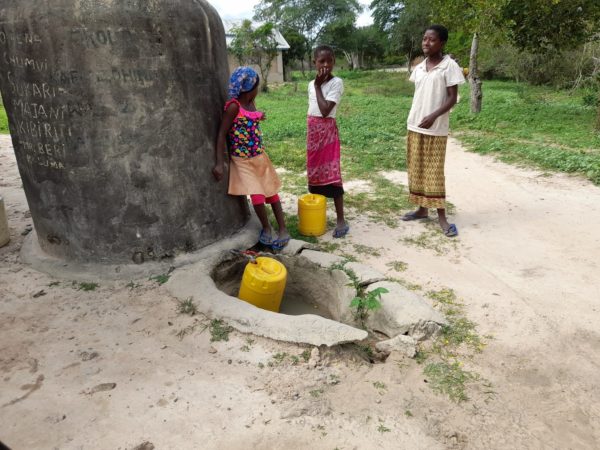 “I am so happy to have achieved all of this in my life, courtesy of ADS Pwani. I now live a dignified life in my community”, says Rachel. And others in the community are living a better life too. Community water jars mean that girls are now able to focus on school and minimize the time they would have wasted in search of water. Access to something as basic as water continues to make a lasting impact.
“I am so happy to have achieved all of this in my life, courtesy of ADS Pwani. I now live a dignified life in my community”, says Rachel. And others in the community are living a better life too. Community water jars mean that girls are now able to focus on school and minimize the time they would have wasted in search of water. Access to something as basic as water continues to make a lasting impact.

